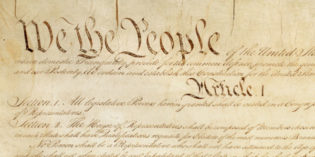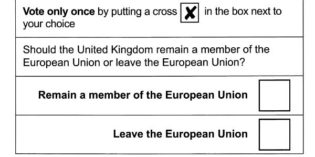Crowdsourcing the Constitution

Making a 21st century constitution: the rules we have established for democracies are now outdated
Democratic constitutions are unfit for purpose, with governments facing increased pressures from populists and distrust from citizens. The only way to truly solve these problems is through reform, argues Frank Vibert. He draws on his new book on the topic and sets out the ways in which constitutions should be revitalised.

The Irish Citizens’ Assembly on the 8th Amendment is a model for participatory democracy, which other democratic countries should follow
Ireland’s referendum to repeal the 8th Amendment of its constitution, and so liberalise the country’s abortion laws, was preceded by a Citizens’ Assembly which recommended these reforms. This form of democratic participation, which crucially was state funded and informed the Irish government’s approach, is a model for producing better democratic decision making, argues Jack Bridgewater.

Gender and power-sharing – why a Citizens’ Assembly is needed in Northern Ireland
The prospects for Northern Ireland’s power-sharing democracy look bleak. A Citizens’ Assembly is planned for members of the public to deliberate on the disputed topics. Claire Pierson and Jennifer Thomson argue that these forms of public participation have a particular benefit for the representation of women, and has the potential to break down entrenched party political divides.

A citizens’ convention for UK democracy is more necessary with every passing day
Many democratic societies have benefited from establishing conventions of citizens chosen at random to deliberate on major constitutional questions. Now is the time for the UK to have its own citizens’ convention, argue Graham Allen and Andrew Blick, to rebuild and renew our fractured representative democracy.

Beyond the binary: what might a multiple-choice EU referendum have looked like?
Voters in the EU referendum could choose only between leaving and remaining – with no say on whether to stay in the single market, renegotiate a different deal or even integrate more fully with the EU. Lily Blake argues a multiple-choice referendum of the kind held occasionally abroad would have been less divisive, set a […]

20 things we learned about democracy in March 2015
The General Election is (nearly) here! And here at Democratic Audit UK, we’ve been ferreting away trying to find the most interesting clumps of information, conjecture, opinion and miscellaneous. Collating it all for your pleasure, as ever, is Sean Kippin, who has been helped enormously by the launch of the Democratic Dashboard – a new voter resource bringing […]

A written British constitution would do much to enhance Britain’s democracy and the wellbeing of its citizens
Britain famously has no written constitution, opting instead to govern itself with reference to a set of conventions, laws, and traditions without formal codification. Vittorio Trevitt argues that this system has past its sell-by date, and should be replaced by a written constitution. Similar PostsFive minutes with Graham Allen: “unlike most democracies, the UK lacks […]

Citizens’ assemblies provide an institutional foothold for republican political practices
Calls for a UK citizens convention to assess and rethink our current political and democratic arrangements have been frequently heard in the wake of the referendum on Scottish independence, held last autumn. John Grant argues that these conventions can be useful in providing an institutional foothold for republican ideas, which have struggled to find a policy […]

20 things we learned about democracy in January 2015
Christmas is over, 2015 is here, and the General Election we are constantly being told is only a matter of (tens of) days away. As the locomotive that is British democracy chugs back into gear after its winter break, we are left, as ever, questioning whether we actually learned anything new. Fortunately, Democratic Audit UK’s Sean […]

Should a codified UK constitution include reform or attempt to describe current arrangements?
Most advocates of constitutional reform agree on the basic desirability of a written constitution, but to what end? Should it seek to codify our existing political and constitutional arrangements, or put in place a new settlement? Here, Richard Gordon tackles this question, looking at the competing viewpoints that surround the issue. Similar PostsInterview: Richard Gordon on […]


 Democratic Audit's core funding is provided by the Joseph Rowntree Charitable Trust. Additional funding is provided by the London School of Economics.
Democratic Audit's core funding is provided by the Joseph Rowntree Charitable Trust. Additional funding is provided by the London School of Economics.